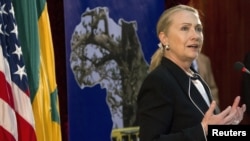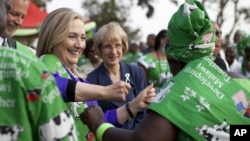Senegalese-born analyst Abdou Lo said US Secretary of State Hillary Clinton’s visit to Senegal Wednesday indicates the United States views Senegal as a strong partner in the fight against the growing threat of extremists in West Africa.
Lo, general manager of Primum Africa Consulting, which promotes and defends human rights in Senegal and Africa, attended Clinton’s speech to university students and officials in Dakar and said, while the United States cannot deploy troops to assist West African countries in dealing with the Islamist threat, it can help with intelligence and logistics.
“As you know, it’s a bit complicated in Mali and Guinea-Bissau, especially in Mali where Islamist groups have set up their headquarters. So clearly, I think one of the reasons of Secretary Clinton’s visit to Senegal is how to deal with the situation in the sub-region where Senegal can be a front partner for America in this battle against terror,” he said.
The Economic Community of West African States (ECOWAS) has renewed its pledge to send troops to Mali to help the government recapture northern territory taken by Islamist groups.
ECOWAS Commission President Kadré Désiré Ouédraogo said the regional bloc is ready to deploy its standby force to Mali once the country's interim government makes the request.
Malian interim President Diancounda Traore is expected to request a UN Security Council mandate for a regional intervention force.
ECOWAS has said the lack of a UN mandate is its only hurdle in the deployment of its 3,000-member military force to Mali.
In her speech Wednesday in Senegal, Clinton called on all parties in Mali to agree on restoring a civilian leadership and deal with radical Islamists in the north of the country.
Lo said, while Washington may not want to send troops to Mali, it can assist West African countries in other ways.
“America cannot send troops to Mali, neither can France. But, what it [U.S.] can do is to back up the West African troops by assisting them in terms of logistics and in terms of intelligence,” Lo said.
Clinton's Africa trip comes against a background of rapidly rising Chinese trade and investment on the continent.
China surpassed the United States in 2009 becoming Africa's largest trading partner, and the volume of trade has continued to rise dramatically.
The two-way exchange was valued at $160 billion last year, compared to just $10.6 billion a decade earlier and $1 billion 20 years before that.
Chinese aid and investment in Africa have also grown rapidly as Beijing looks to the resource-rich continent as a source of raw materials for its rapidly industrializing economy.
In her speech, Clinton did not refer directly to China. But, she said, “America will stand up for democracy and universal human rights even when it might be easier or more profitable to look the other way, to keep the resources flowing.”
Lo said, unlike the United States and Western European countries, China’s investments and aid to Africa have no strings attached.
“China is very fast when it comes to building infrastructure in Africa, stadiums, roads, and hospitals. This is not the case when it comes to America or Europe. Many African countries see China as a very credible and easy partner who is not asking for any favors. So now, America is aware of this new situation,” Lo said.
But, China’s presence in Africa has prompted concerns about labor abuses and corruption. Some US officials have criticized China for financially supporting countries with poor human rights records.
Lo, general manager of Primum Africa Consulting, which promotes and defends human rights in Senegal and Africa, attended Clinton’s speech to university students and officials in Dakar and said, while the United States cannot deploy troops to assist West African countries in dealing with the Islamist threat, it can help with intelligence and logistics.
“As you know, it’s a bit complicated in Mali and Guinea-Bissau, especially in Mali where Islamist groups have set up their headquarters. So clearly, I think one of the reasons of Secretary Clinton’s visit to Senegal is how to deal with the situation in the sub-region where Senegal can be a front partner for America in this battle against terror,” he said.
The Economic Community of West African States (ECOWAS) has renewed its pledge to send troops to Mali to help the government recapture northern territory taken by Islamist groups.
ECOWAS Commission President Kadré Désiré Ouédraogo said the regional bloc is ready to deploy its standby force to Mali once the country's interim government makes the request.
Malian interim President Diancounda Traore is expected to request a UN Security Council mandate for a regional intervention force.
ECOWAS has said the lack of a UN mandate is its only hurdle in the deployment of its 3,000-member military force to Mali.
In her speech Wednesday in Senegal, Clinton called on all parties in Mali to agree on restoring a civilian leadership and deal with radical Islamists in the north of the country.
Lo said, while Washington may not want to send troops to Mali, it can assist West African countries in other ways.
“America cannot send troops to Mali, neither can France. But, what it [U.S.] can do is to back up the West African troops by assisting them in terms of logistics and in terms of intelligence,” Lo said.
Clinton's Africa trip comes against a background of rapidly rising Chinese trade and investment on the continent.
China surpassed the United States in 2009 becoming Africa's largest trading partner, and the volume of trade has continued to rise dramatically.
The two-way exchange was valued at $160 billion last year, compared to just $10.6 billion a decade earlier and $1 billion 20 years before that.
Chinese aid and investment in Africa have also grown rapidly as Beijing looks to the resource-rich continent as a source of raw materials for its rapidly industrializing economy.
In her speech, Clinton did not refer directly to China. But, she said, “America will stand up for democracy and universal human rights even when it might be easier or more profitable to look the other way, to keep the resources flowing.”
Lo said, unlike the United States and Western European countries, China’s investments and aid to Africa have no strings attached.
“China is very fast when it comes to building infrastructure in Africa, stadiums, roads, and hospitals. This is not the case when it comes to America or Europe. Many African countries see China as a very credible and easy partner who is not asking for any favors. So now, America is aware of this new situation,” Lo said.
But, China’s presence in Africa has prompted concerns about labor abuses and corruption. Some US officials have criticized China for financially supporting countries with poor human rights records.







